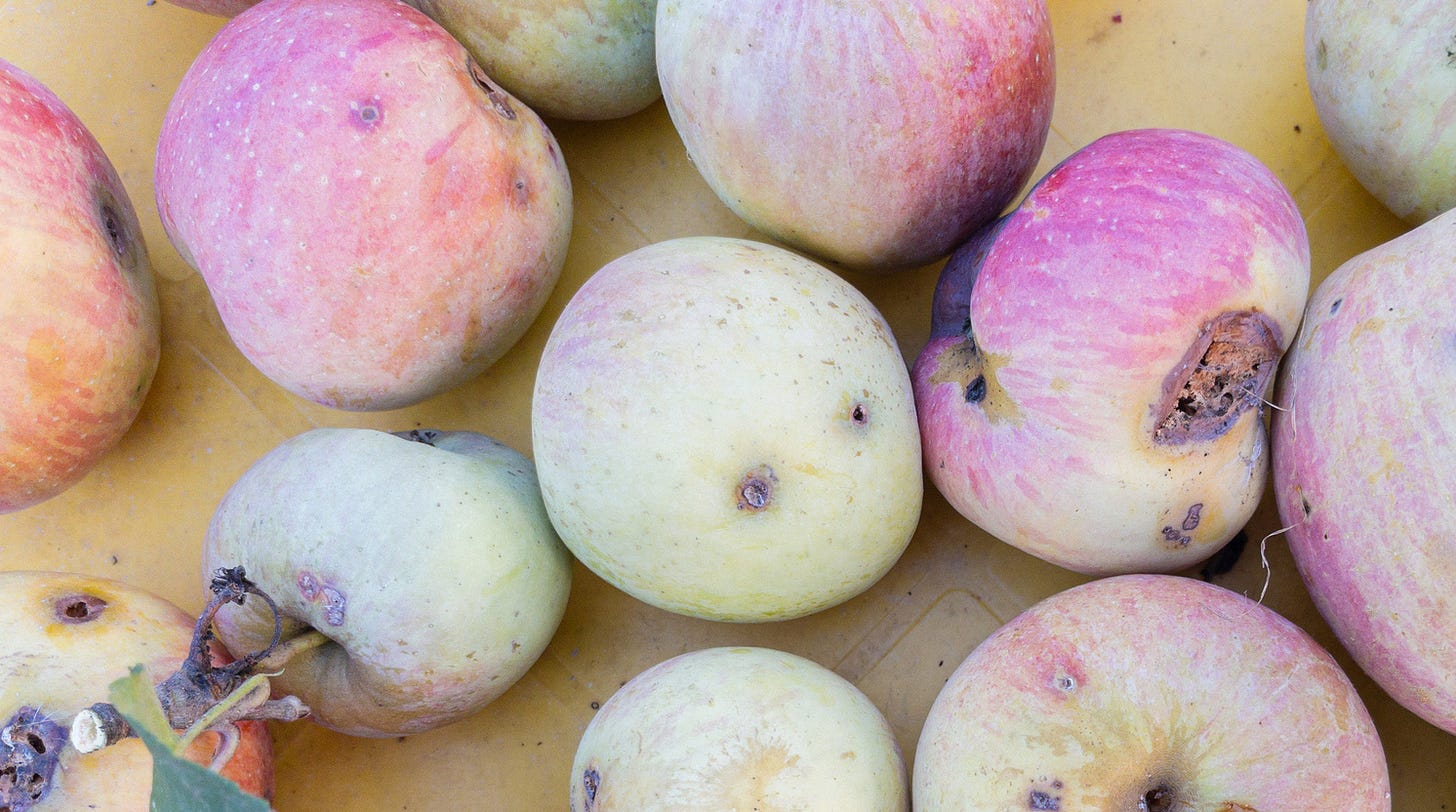The Sebastopol Times is taking a break from news over the holidays. We got 24 submissions to our personal essay contest. This is one of several essays we will be publishing between now and New Year’s. Enjoy! And have a beautiful holiday.
By Sara Alexander
The last thing my mother said to me from her deathbed was, “You, let go.” I was surprised—and a little hurt—by her comment. Although she had not been ill, she was 88, and I had started to imagine losing her, and, in my heart, letting go. But knowing me, I may have said nothing out loud, and she may not have known.
Or it’s possible that she meant “let go” in a larger context. Maybe she had noticed that I have a propensity to hold on to various things: people I love, old food in the fridge, favorite worn-out clothes, gifts from ex-lovers.
Maybe she had, without saying it to me, understood that I am not the very best at letting go.
And that truth extends, at harvest season, to apples. There are so very many of them in my neighborhood: a dozen ancient trees in my yard; abandoned orchards nearby; boxes left by the side of the road with a FREE sign; surplus apples offered by friends in exchange for my surplus tomatoes.
So I end up with a lot of great apples to give away: to city friends, to anyone without a tree, to three Waldorf Kindergarten classes who call me the Apple Lady and invite me in to hear the Apple Song; to anyone, known or unknown, who will take some.
But, still, what do I do with the others? The lesser ones—the hard sour ones that fell off the tree before ripening; even pretty ones that mysteriously have little flavor; mealy ones, wormy ones, too many that got too old.
I find it almost impossible to toss them out, even for the compost pile or the deer or the gophers. These are precious gifts of God, and, like me, full of flaws but still with potential. I cannot not think about people starving in Gaza or Ukraine and in the way too many other godforsaken corners of this planet. So these lesser apples languish in the refrigerator, in boxes in the garage, in baskets on the deck.
I could blame my mother for this. In my early life, she modeled “holding on.” Having grown up in the Depression, she saved a lot of things. She saved old pieces of string tied into bundles. She kept every single rubber band, forming a ball that kept growing in size as it was losing in elasticity. She stayed married to my Dad, even though I sometimes wished she hadn’t. She carefully stored last year’s gift wrap and every ribbon and bow—to be ‘re-used’ before ‘re-use’ became a noun. She wrote letters on old hotel stationery and grocery lists on the back of used envelopes, long before re-purposing had become a fad. The remnants of our Thanksgiving turkey became Turkey Tettrazini the next day. (I do not recommend you attempt this.)
These apples taking up too much space in my home incite enormous love/hate feelings until two things happen at the same time: My life slows down and I can garner some free time, and the world in which I live feels so unmanageable and frightening that I am desperate for something to control—these grubby, second-best apples.
So into the pot they go: the old ones and the ugly ones, now trimmed of their worm holes and brown spots; the soft ones and wrinkled ones; even the ones that fell off the tree too soon.
And, because I like my applesauce pink and tangy, I throw in a jar or two of plums. I had too many of them, as well, and now, poached with star anise, they have been languishing in the freezer for many months. I try to offer them up for dessert but, even napped with cream, they are never best sellers.
I am enough of a home chef to understand that the freshness of ingredients greatly enhances the success of any recipe. I know this is risky business. But, just the same, I toss all these stragglers into the biggest pots that I have, compelled to experiment.
I cook them all up and pray for alchemy, hoping for a lucky outcome. Just sometimes I get a delicious, pink and tasty sauce. Sometimes holding on gets a great result.
Sara Alexander is a psychotherapist and writer who lives in Sebastopol and San Francisco.


What a wonderful, touching essay. Thank you.
Hi Sarah. This is Paula from your local Slow Food chapter. We operate the Free Sebastopol Apple Press in Sebastopol every year from August through October and have been working to save local apples, especially the Gravensteins, for years. We have a great group of volunteers and we help press over 50,000 pounds of folks' apples, for free. . We love your article and would love for you to join us. please write to me at info@slowfoodrr.org. I can meet you for coffee and tell you more. would love to meet you.